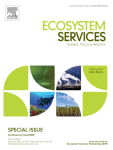Ver ítem
- xmlui.general.dspace_homeCentros Regionales y EEAsCentro Regional Buenos Aires SurEEA BalcarceArtículos científicosxmlui.ArtifactBrowser.ItemViewer.trail
- Inicio
- Centros Regionales y EEAs
- Centro Regional Buenos Aires Sur
- EEA Balcarce
- Artículos científicos
- Ver ítem
Ecosystem services research in contrasting socio-ecological contexts of Argentina: critical assessment and future directions
Resumen
In Argentina, agricultural expansion and intensification has stimulated the utilization of the ecosystem services (ES) approach to understand the consequences of land-use and land-cover changes. However, Argentina's increasing trends of environmental degradation and social conflict due to agriculture continue unabated. We qualitatively analyzed 24 published ES studies done in either the temperate Pampean (context of consolidated agriculture) or
[ver mas...]
In Argentina, agricultural expansion and intensification has stimulated the utilization of the ecosystem services (ES) approach to understand the consequences of land-use and land-cover changes. However, Argentina's increasing trends of environmental degradation and social conflict due to agriculture continue unabated. We qualitatively analyzed 24 published ES studies done in either the temperate Pampean (context of consolidated agriculture) or subtropical extra-Pampean regions (context of expanding agriculture), in order to identify country-level and context-specific research needs and gaps, and propose ways to address them. We observed that ES studies in both contexts: (i) tended to focus much more on the biophysical, supply-side of the ES cascade than on the assessment of cultural ES and benefits, (ii) invested more effort in describing coarse ecological patterns/processes than in producing locally-adapted knowledge through stakeholder participation, and (iii) were poorly articulated with decision-making processes regarding sustainable ecosystem management. Despite this, some ES studies performed in the context of expanding agriculture showed incipient efforts to recognize, disaggregate and involve stakeholders, and to understand ES values. To increase the applicability of ES knowledge in decision-making, “strong” transdisciplinary approaches should be implemented so that changes in ES delivery and values feedback on management decisions for reverting environmental degradation.
[Cerrar]

Autor
Mastrangelo, Matías Enrique;
Weyland, Federico;
Herrera, Lorena Paola;
Villarino, Sebastian Horacio;
Barral, Maria Paula;
Auer, Alejandra Denise;
Fuente
Ecosystem Services 16 : 63-73 (December 2015)
Fecha
2015-12
Editorial
Elsevier
ISSN
2212-0416
Formato
pdf
Tipo de documento
artículo
Palabras Claves
Derechos de acceso
Restringido
 Excepto donde se diga explicitamente, este item se publica bajo la siguiente descripción: Creative Commons Attribution-NonCommercial-ShareAlike 2.5 Unported (CC BY-NC-SA 2.5)
Excepto donde se diga explicitamente, este item se publica bajo la siguiente descripción: Creative Commons Attribution-NonCommercial-ShareAlike 2.5 Unported (CC BY-NC-SA 2.5)

